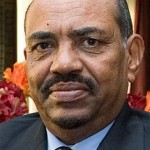Wins election
In the first elections — for president, parliament and other local positions — in 24 years, Bashir wins with 68.24 percent of the vote, just under seven million votes. The voting is scrutinized by about 750 international and 18,000 domestic observers.
Wins election
Elections are held for a president and a new National Assembly from March 2-28, the first since the coup. 125 members of the 400-seat National Assembly are nominated before the election, leaving 275 seats to be elected (of which 51 were ultimately uncontested). There are no political parties — all candidates ran as independents. Leaders of the Sudan’s main opposition parties, disbanded when Bashir took power, boycott elections. Ousted Prime Minister Mahdi, calls the elections a cheap attempt by the Government to buy legitimacy.
Bashir is elected president with 75.7% of votes. He will serve a five-year term, after which he will be allowed to run once more. He tells the crowd:
We have fully returned power in full to the people.
The New York Times reports the power behind Bashir’s government is widely believed to be the militant Muslim cleric Turabi, who is elected to a seat in Parliament in Khartoum.
Appointed president
Sudan announces return to civil rule and appoints Bashir as president. Before disbanding, the Council issues a decree specifying that Islamic law will be the basis of Sudan’s political system, but guaranteeing freedom of religion. The Council’s deputy leader says the move is necessary “to put a framework for the government.”
